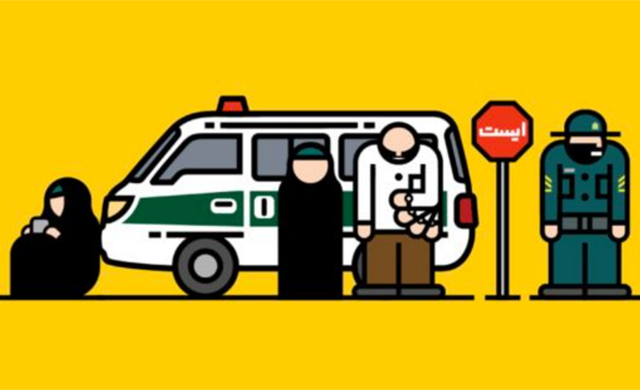New App that Detects Morality Police is Instant Hit in Iran

Authorities Block App within 24 Hours of Its Debut
A smartphone application aimed at helping Iranian users avoid the country’s morality police became a smash hit immediately after it was released today, with its servers being inundated by requests, according to one of its creators.
The Gershad app allows users to mark spots on the Tehran city map where the Gasht-e-Ershad (or Guidance Patrol, commonly known as the “morality police”) units are located, in order to help potential targets avoid those areas.
Iran’s notorious morality police, a branch of the security forces co-directed by the Revolutionary Guards and Interior Ministry, routinely subject Iranian men and especially women to harassment and arrests for alleged inappropriate public behavior.
Gershad’s servers were flooded by requests yesterday when the app was released, one of its creators told the International Campaign for Human Rights in Iran. Perhaps detecting the high demand, the Iranian government has already blocked access to the app.
Gershad’s developers are currently taking steps to get the app back online, a source told the Campaign.
The Gershad app, which only works on Android devices, was mainly developed in response to the morality police’s harsh and tireless efforts against its favorite target: Iranian women who do not observe strict hijab (female head covering and dress) in public.
Hardliners in Iran frequently complain that officials are not doing enough to preserve their ideals of public morality. Conservative media and many Friday Prayer leaders throughout the country also often incite radicals and vigilante groups to take the law into their own hands by imposing Islamic morality laws upon the citizenry themselves.
Despite these measures and exhortations, Iranian women appear yet to be convinced. According to Police Spokesman Saeed Montazer al-Mahdi, during the Persian year ending March 2014, the police “obtained 207,053 pledges from norm-breakers [women who had not sufficiently observed strict hijab] in writing [to observe the law], referred 18,081 cases to the Judiciary, and gave warning and guidance to 2,917,000 other norm-breakers.”
The development of the app and the enthusiastic response it has so far received, also suggest Iranians are hungry for new ways to resist repressive laws. Indeed, after four decades of conservative religious social and cultural dictates, near-obsessive focus on female dress codes, and the imposition of the Islamic Republic’s “code of morality” on society, if given half a chance and a favorable wind from technology, the real “demand” in Iranian society today appears to be to live one’s lifestyle without getting arrested for it.
Within hours of its release, more than a 1,000 individuals were using Gershad, an inside source told the Campaign, adding that user security was being protected through an encrypted SSL protocol. The app’s servers are also located outside of Iran and run by a private company “whose impenetrable secure technology has been tried and tested,” said the source.
Despite Gershad’s assurances, however, it’s too soon to judge the app’s effectiveness and security. One obvious concern relates to morality police or security forces using the app to set traps for unsuspecting users.
But the Gershad source told the Campaign that its developers have “imposed some limits on users and we will make them more effective over time.”






